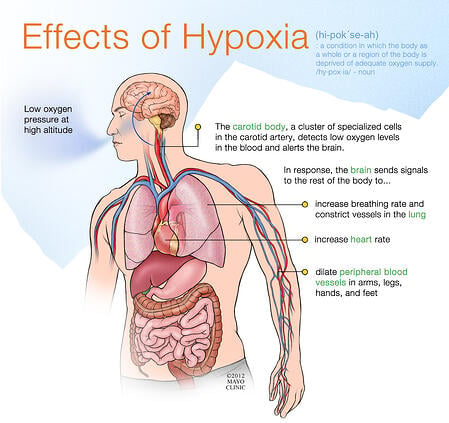Why Does Hypoxia Occur?
When a sever case of oxygen deficiency occurs then it is referred to as hypoxia, and the way your body naturally responds could be the cause of your problematic breathing.
As a natural response to hypoxia the body cranks up production of hemoglobin in the oxygen poor blood.
Hemoglobin is responsible for carrying oxygen throughout the blood. Once a high concentration of hemoglobin begins being produced, it thickens the blood making it harder for blood to flow unrestricted.
Symptoms of Hypoxia
Patients experience different symptoms at different frequencies, but common hypoxia symptoms include:
- Coughing
- Fast Heart Rate
- Rapid Breathing
- Shortness of Breath
- Sweating
- Wheezing
- Confusion
- Change in Skin Color (Blue or Red)
Direct Causes of Hypoxia
If you suffer from asthma or COPD, a basic asthma attack or COPD flare-up can be the direct cause for hypoxia in both adults and children.
This is due to during an attack or flare-up the airways narrow, making it increasingly difficult for air to enter the lungs.
The presence of coughing only makes things worse, as it is used to expel mucus but actually can cause symptoms to worsen due to the necessity for higher amounts of oxygen.
Additional causes of hypoxia also includes:
- Chronic Obstructive Pulmonary Disease (COPD)
- Emphysema
- Heart Problems
- Anemia
- Pulmonary Edema
- Pneumonia
- Pulmonary Fibrosis




